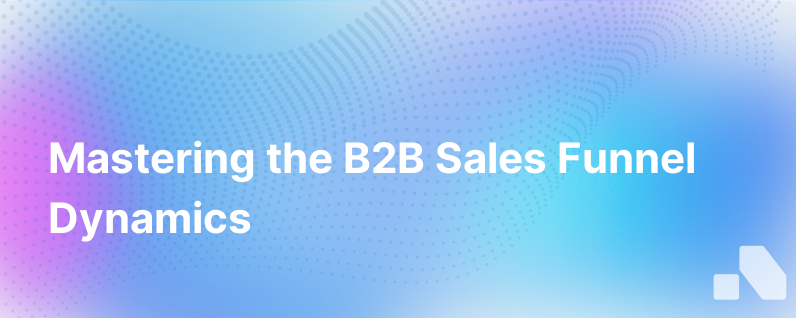
In the dynamic world of B2B (Business-to-Business) sales, the sales funnel serves as a conceptual roadmap, guiding potential customers from the initial awareness stage to the final decision of purchase. This funnel, often nuanced and complex, is pivotal in structuring a company's sales approach and in understanding the stages a prospective client navigates before committing to a product or service.
Understanding the intricacies of the B2B sales funnel is vital. A well-structured funnel not only helps in chalking out a targeted sales strategy but also allows businesses to fine-tune their marketing efforts, ensuring that they reach the right audience at the right time with the right message.
The B2B Sales Funnel Explained
At its core, the B2B sales funnel is divided into several stages:
- Awareness: Prospects become aware of your solution. This could be through content marketing, word of mouth, or outbound campaigns.
- Interest: Potential clients show interest in your offerings and start to engage with your content or salespeople.
- Consideration: Prospects evaluate your product among other competitors and begin the deeper assessment process.
- Intent: The stage where the prospect's actions indicate a genuine buying interest, such as requesting a demo or a price quote.
- Evaluation: A more detailed look at your offering occurs, with possible objections and competition comparison happening.
- Purchase: Finally, the moment when a prospect turns into a customer by making a purchase decision.
Elevating Your Understanding: The B2B Sales Funnel Deep Dive
Stage One: Awareness
This is when a potential client first learns about your brand or solution. It's pivotal to make a strong first impression. Awareness can be generated through various channels including SEO (Search Engine Optimization), PPC (Pay-Per-Click) campaigns, social media outreach, and insightful, thought-leadership content.
In this noisy digital age, standing out is not just about being seen; it's about being recognized for offering value through educational blogs, webinars, or even whitepapers that target pain points and the interests of potential clients.
Stage Two: Interest
Once awareness peaks interest, potential clients might follow you on social media, subscribe to a newsletter, or engage with interactive elements on your website. At this point, nurturing these leads is critical, and content marketing is key. Tailored email nurturing campaigns, as well as retargeting strategies, are common tactics utilized to maintain and deepen this interest.
Stage Three: Consideration
This is where prospects start to actively compare your offerings with those of your competitors. It's critical to differentiate your product by highlighting USPs (Unique Selling Propositions) and value-adds. Case studies, client testimonials, and detailed product information sheets can be influential in swaying the prospects' decision in your favor.
For the B2B technical buyer, deep-dive content such as whitepapers, product videos, and detailed FAQs can provide the in-depth information needed to move from passive interest to serious consideration.
Stage Four: Intent
In the intent stage, a lead's actions indicate they are close to a buying decision. It’s key for sales teams to step in and provide demos, trials, or consultations. These engagements should be designed to clarify any doubts and to solidify the value and utility that the product or service brings to the prospect.
Stage Five: Evaluation
During evaluation, your prospective client is close to making a decision but needs assurance about the quality and applicability of your solution. Here, personal relationships built during the sales process come into play. A sales rep’s responsiveness, understanding of the client’s needs, and the ability to tailor the offering to these needs often tip the scales.
Some companies opt to create a PO (Proof of Concept) or a customized demonstration at this stage to showcase exactly how their service or product can work for the client's specific situation.
Stage Six: Purchase
Finally, in the purchase stage, negotiations materalize, contracts are signed, and a deal is closed. Efficiency and clarity in communication are essential here to ensure a smooth transition for the client into their new purchase.
Nurturing Beyond the Funnel
However, even after a purchase, the funnel isn’t truly complete. The post-purchase experience is crucial for retention, referrals, and potentially upselling in the future. Ensuring customer success and ongoing support leads to satisfaction, which fosters loyalty and can turn new customers into vocal advocates for your brand.
Maximizing the B2B Sales Funnel Efficiency
Having a well-structured B2B sales funnel is not enough. Companies need to track metrics at each stage to refine their strategies and to identify bottleneck stages. Conversion rates, the average time spent in each stage, and customer acquisition costs are some of the essential metrics to track.
Moreover, in today's data-driven environment, leveraging tools like CRM platforms, analytics software, and marketing automation can increase the efficiency and adaptability of your sales funnel.
Introducing the Role of AI
In the context of a B2B sales funnel, AI is revolutionizing how businesses identify, nurture and close leads. A platform like Aomni applies AI to streamline steps and enhance effectiveness across the sales funnel. AI can be used to:
- Automate repetitive tasks to free up time for sales reps.
- Provide predictive analytics to identify high-quality leads.
- Personalize marketing efforts to increase conversion rates.
- Deliver real-time insights and competitive intelligence.
Conclusion
The B2B sales funnel is an indispensable tool for any business operating in the B2B space. From inciting awareness to closing a deal, each stage is critical to achieving successful sales outcomes. By continuously analyzing and optimizing each stage of the funnel, businesses can not only close more deals but also create lasting relationships that lead to sustainable growth.
And while this article does not intend to sell you on any one solution, it's clear that incorporating AI-powered tools like Aomni can significantly refine your B2B sales funnel and help your business thrive in a competitive market.